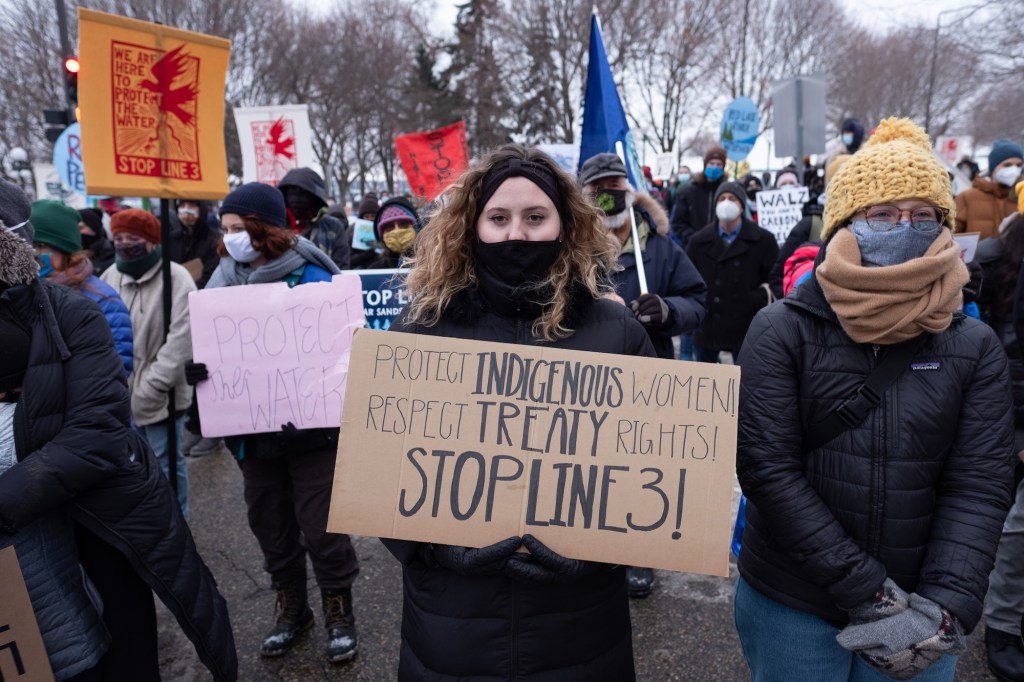This is an opinion piece by Representative Mary Kunesh-Podein (DFL), a member of the Minnesota State House of Representatives.
Everyone is familiar with the Dakota Access Pipeline (DAPL), but an equally troubling project is emerging in Minnesota, my home state. Enbridge, a Canadian oil transportation company, is pushing for a new “Line 3,” a tar sands crude oil pipeline that would run from Alberta, Canada to Superior, Wisconsin. It includes 337 miles of new pipeline through northern Minnesota.
Videos by VICE
This project has special significance to me. As a state legislator, I promised to protect the environment. My family has a rich history in Standing Rock where I can trace my ancestry back for generations to Skuyapi and Lame Deer, Hunkpapa Lakota Sioux. Pipeline decisions matter to me from a policy standpoint, but more importantly, they are close to my heart.
Like DAPL, Enbridge Line 3 is bad for the environment. It violates treaty rights. Also, based on our domestic fuel consumption, we don’t need it.
Enbridge calls this a “replacement project,” but that’s a misnomer. When you replace a light bulb, you take out the old bulb and put it a new one just like it. That’s not the case here.
Enbridge’s current Line 3 is old and failing. Enbridge is not going to dig it up and replace it; they are going to leave the old line in the ground to fall apart. Instead, they want to install a new and larger Line 3, much of it along a new route. That route crosses a number of Minnesota’s prime wild rice lakes and streams as well as the Mississippi headwaters, the worst route imaginable.
Further, replacing a deteriorating 34-inch diameter pipeline with a new 36-inch pipeline would increase the line’s capacity. That’s no replacement.
Like other controversial tar sands pipelines, there is just no need for this project. As a nation, we are importing more crude than we need for domestic use. The United States is now a net exporter of gasoline. Importing more Canadian tar sands oil is not about US energy security; it’s about corporate profits from exports.
My priorities are to protect the Earth, continue to reduce fossil fuel consumption, and develop more renewable energy. Enbridge Line 3 is taking us in the wrong direction.
Line 3 is now before the Minnesota Public Utilities Commission. It is deeply upsetting to me that Enbridge has gotten this far without collaborating with the Anishinaabe (Ojibwe) people. The Treaties of 1854, 1855, and 1867 guarantee the Anishinaabe the right to hunt, fish and gather wild rice through much of northern Minnesota, including off-reservation lands along the proposed pipeline route. Leaks and ruptures would endanger natural resources and threaten treaty rights. Enbridge can’t be allowed to unilaterally violate them.
The state has validated this threat in its recently released draft Environmental Impact Statement, which notes that the impacts of the pipeline “would be an additional health stressor on tribal communities” and that it “would have a long-term detrimental effect on tribal Members as a result of crossing treaty lands.”
Why is this project still under consideration in its current form if it violates treaties?
Just like Standing Rock, Native rights are being ignored. How would any of us feel if we got a letter saying a foreign company was going to run a large crude oil pipeline through our backyard and we were told: “Deal with it”?
There are profound moral issues, too, that cross our borders and affect our northern neighbors. The health impacts on Canadian and First Nations communities living downstream from the mining are alarming. Consider Fort Chipewyan, where residents rely on local fish and wildlife. The report said Canadian government studies: “found unusually high rates of cancer among the community of Fort Chipewyan. In 2014, researchers determined that Fort Chipewyan members’ consumption of traditionally-caught fish and meat were linked to these high cancer rates.”
Why should they pay with their lives for the pipeline? Why should Minnesota?




